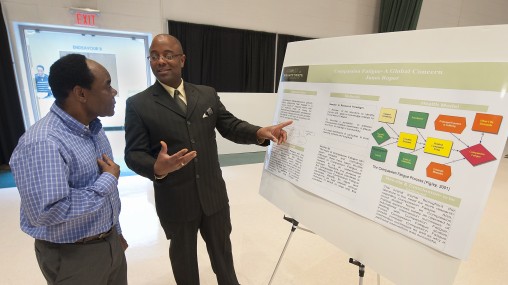
Janos Roper (right) shares his poster "Compassion Fatigue-A Global Concern" with Wright State Director of Accounting John Mbagwo.
Last Friday, students from a wide array of disciplines were given the opportunity to showcase their academic endeavors at the Celebration of Research, Scholarship and Creative Activities.
For the fourth year in a row, undergraduates students, graduate students and faculty came together for Celebration of Research to exhibit their discoveries, advances and scholarly explorations.
“It’s a wonderful chance for students doing research of independent studies to show off their hard work,” said Dominique Belanger, Ph.D., research assistant professor.
The event was Friday, April 12, from 9 a.m. to 4 p.m. at the Student Union Apollo Room.
“The Celebration of Research marks the first opportunity some students have to practice standing in front of an audience, demonstrating their work,” said Belanger. “This builds confidence, and you have to start somewhere.”
At the Celebration were 110 academically diverse poster and oral presentations that represented both the liberal arts and the STEM (Science, Technology, Engineering and Mathematics) disciplines.
Subjects ranged from federal financial whistleblower acts to the genetic diversity and differentiation in Egyptian geese of southern Africa.
“There’s a stigma that research is only being done in the sciences, and that’s not true. It’s done in liberal arts too,” said Belanger. “It’s done in education, it’s done in theater and music. It’s everywhere. It just takes on a different form.”
Larissa Swartz, a junior Spanish major, demonstrated this diversity in research through a presentation on poverty and inequality in Latin America called “Pobre la Marîa.”
Swartz and some of her classmates collaborated to write, direct and film an original play that tells the story of a Latin American woman who came to the United States in search of a better life.
“The Celebration of Research was a good experience to share what we had learned, what we are still learning, and it was a chance to learn from others, said Swartz. “In college, it’s necessary to share ideas and knowledge.”
According to their abstract, Swartz’s group gained further confidence in their abilities as non-native Spanish speakers and now have a better understanding of not only Spanish, but of the people who speak it.
“It’s different on the liberal arts side,” said Swartz. “In modern languages, we don’t do any language research, per se, but instead we discover new ways of language acquisition and interesting nuances about Spanish.”

 Wright State’s Homecoming Week features block party-inspired events Feb. 4–7 on the Dayton Campus
Wright State’s Homecoming Week features block party-inspired events Feb. 4–7 on the Dayton Campus  Wright State music professor honored with Ohio’s top music education service award
Wright State music professor honored with Ohio’s top music education service award  Wright State’s Industrial and Human Factors Engineering program named one of top online graduate programs by U.S. News
Wright State’s Industrial and Human Factors Engineering program named one of top online graduate programs by U.S. News  Student-run ReyRey Café celebrates decade of entrepreneurship at Wright State
Student-run ReyRey Café celebrates decade of entrepreneurship at Wright State  Wright State faculty member Damaris Serrano wins Panamanian literary award
Wright State faculty member Damaris Serrano wins Panamanian literary award 